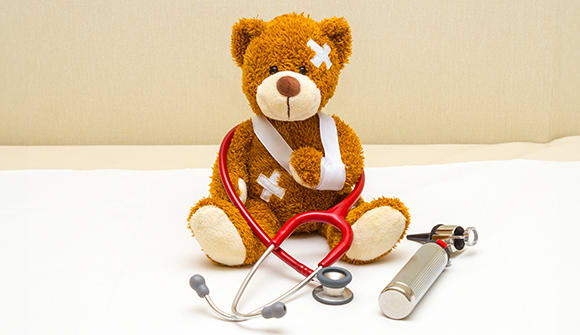Infant emergencies
When to take your baby to the emergency department.
Article Date:

Being a new parent and caring for a new life may feel overwhelming. With every peep or squeak your baby makes, you wonder if it’s the first sign of something serious. And, while most rashes, upset tummies and yucky diapers are just part of raising a little one, some signs and symptoms should prompt parents to head straight to the emergency room.
Just like routine well-child visits help keep your child healthy and track their development, emergency care can detect underlying issues you may not see with the naked eye after a fall, an episode of vomiting or a high fever. And with some symptoms, it's best not to wait to seek care.
Fevers in infants vs. children
Fever, a common symptom of worry for parents, can be a sign of a complex condition that needs treatment right away.
"Definitely, in babies 2 months old and younger or those who are not immunized against certain illnesses, the recommendation would be to bring them to the ER for any fever over 100.4 F or continuous fever lasting more than 5 days,” said Pulin Koul, MD, a pediatric emergency medicine specialist with Emergency Resources Group who sees patients at Wolfson Children’s Emergency Centers. “A fever in an infant is more likely to be an indicator of something serious than a fever in an older child. If your child is vaccinated, you’ve protected them from most serious vaccine-preventable infections. Other reasons for fevers are common viral infections.”
Common reasons for infant ER visits
In addition to fever, experts recommend seeking emergency care for an infant for:
- Animal bites or scratches, especially from stray dogs, or exposure to bats.
- Falls, drops and other types of trauma.
- Hyperthermia (overheating).
- Near-drowning (known formally as "submersion injuries").
- Skin rashes that cause discomfort or don’t blanch (fade or turn white) when pushed on.
- Vomiting (especially when persistent or green) or diarrhea (especially if it has a red or black appearance).
"We do see a fair share of babies who fall from beds, cars, counters or down the stairs, or who are dropped by someone who was holding them, and the vast majority of these kids are going to be just fine,” Dr. Koul said. “However, you really need a pediatric trauma expert to do an assessment. If your child falls and hits their head, especially if they have a large bump or you're concerned, bring them to the ER. Chances are they'll be fine, but we are here when you need us."
Vomiting and dehydration are also serious concerns for infants.
"With infants, persistent vomiting and inability to take in fluids are causes for concern. Abdominal pain is also very important for us to examine because it could indicate appendicitis, intestinal obstruction or malrotation (incorrectly positioned intestines),” Dr. Koul said. "Or, it could be as simple as colic or milk protein allergy. Bleeding from the rectum in infants is not common, and it's always something that needs to be addressed.
“With skin rashes, our general train of thought is if it doesn't bother the child, he or she is probably OK. If the rash is irritating or painful, that could be different."
When to call 911
Parents may wonder when it's best to take their child to the nearest children's ER instead of calling 911. In most cases, taking your baby yourself is a safe option.
"It's almost always OK to bring your child by private vehicle, and may even be safer because you can strap them into their own car seat,” Dr. Koul said. “However, if your child isn't acting like themselves, falls from a great height, or you're concerned about your child receiving life-sustaining care, definitely call 911. It's never wrong to call the ambulance."
Ultimately, parents are urged to listen to their gut instincts. If they think their child may need to go to the ER, it's best to err on the side of caution. Parents should pay particular attention to any change in color of the child, crying pattern (like whimpering), feeding pattern (poor suck/latch for infants), or if they’re just not being their usual self.
“It's hard for parents to know what to do because every child is so different, and you get advice from so many different people,” Dr. Koul said. “Just bring them in. We'll make sure your child is OK. After all, we have spent years training to specialize in kids; this is all we do, and we see kids all day every day."
When in doubt, it's always best to see a doctor
If your baby is experiencing symptoms that concern you, please take him or her to the nearest children's ER. Visit wolfsonchildrens.com/er to find the Wolfson Children's Emergency Center nearest you, including a new location at Nassau Crossing.



